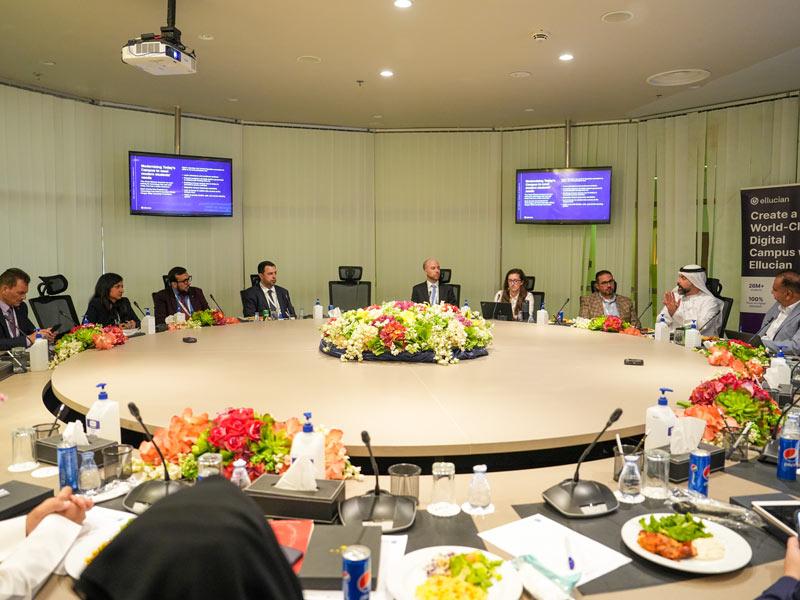A round table at the 2023 THE Digital Universities MENA event, held in partnership with Ellucian, brought together senior leaders in higher education and leadership and team members from Ellucian to explore digital solutions to the challenges of student enrolment and retention faced by universities in the MENA region.
Basel Abu-Khiran, strategic business advisor for the Middle East and Africa at Ellucian, highlighted the importance of connecting campuses to encourage synergy across processes. Successful digital transformation can make this connectivity happen. “The ability to provide flexible solutions and flexible and remote learning is a key aspect,” he said.
Omar Al-Jarrah, chief innovation officer and vice-president of planning and development at Arab Open University, said that while admissions at his institution are up, retention is a problem. “This is why we have deployed a student learning analytics system that will help us increase success and improve the student experience,” Al-Jarrah said.
Melissa Manuel, university registrar at Neom U in Saudi Arabia, suggested that the entire supply cycle should be analysed. “Look at your recruiting, look at the enrolment and look at the retention,” she said. “Then compare that to where you are getting those students from and then look at their postgraduate success.” This will create a recruitment funnel that helps universities attract high-calibre students and maximise graduate success.
Microcredentials and other alternatives available to learners have increased the need for a student-centric approach, said Fadi Aloul, dean of engineering at the American University of Sharjah in the United Arab Emirates. Aloul said that his university focuses on “the three Rs” to improve the student journey. “We want to recruit the best students, we want to retain the students and we want to reward them with a degree,” he said.
Aloul said that the digital evolution of the education sector during the Covid-19 pandemic showed that technology can assist teachers in improving the student experience. This has resulted in technology being embedded across all areas of student learning and life. He added that personalised communication is a key part of successful digital transformation.
With digital transformation, the student experience can be tracked and improved from first contact. “Recruitment is the student’s first encounter with the university,” said Abu-Khiran. “That encounter needs to show how the university will provide an experience to students.” He recommended incorporating a virtual assistant as part of a university’s digital transformation plan.
The panel agreed that while digital advancement is necessary, a sense of community must also be maintained to ensure student retention. Sara Amjad, assistant dean of administration for student affairs at New York University Abu Dhabi, said that setting up a mandatory peer mentoring system for first-year students helps them navigate problems or concerns they might face. While modernising campuses can improve digital capabilities in education, preserving social interactions on campus is equally important in enriching the student journey, the panel concluded.
The panel included delegates from the following organisations:
- Ajman University
- Alfaisal University
- American University of Sharjah
- American University of the Middle East
- Arab Open University
- Ellucian
- Jordan University of Science and Technology
- Neom U
- New York University Abu Dhabi
- Prince Sultan University
- Times Higher Education
Find out more about Ellucian.


comment